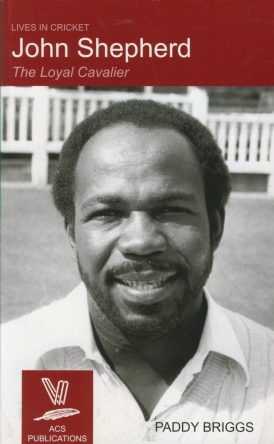John Shepherd: The Loyal Cavalier
Martin Chandler |Published: 2009
Pages: 137
Author: Briggs, Paddy
Publisher: ACS
Rating: 4 stars

The problem was that the day job took up more of my time back in the noughties, so although I invested in every volume in the ACS Lives in Cricket series as soon as they were released, I didn’t have the time to read them all. Only recently, as regular readers of our reviews will realise, have I had the opportunity to start to catch up, and with this one I discover once again that I missed an excellent book.
In fact the only disappointment with John Shepherd: The Loyal Cavalier is that in the fourteen years since it was published author Paddy Briggs hasn’t had another crack at the genre. But at least I have recently seen the occasional tweet from him that suggests he might be mulling over another project, and indeed it was that knowledge that prompted me to have a look at this one.
‘Shep’ was part of the fabric of my youth. He was part of a superb Kent team that were right up there with the Lancashire team that I idolised. So I often wanted to see him fail, although he rarely did, and in truth as long as the outcome of the match he was playing in didn’t affect the Red Rose I enjoyed watching his bustling medium fast bowling and aggressive batting as much as anyone.
A ‘proper’ overseas player Shep played all summer long for Kent for fifteen years and then, after they decided to dispense with his services, he rolled back the years for another three seasons at Gloucestershire. His tenure began back in the days before the instant registration of overseas players, so before those fifteen Kentish summers Shep had two years in the seconds and club cricket gaining the residential qualification he needed.
Briggs is a lifelong Kent supporter, so he saw plenty of Shep in action and then, having decided to write his biography, secured his full co-operation with the project. This is something that makes a huge difference to any life story and, to those who remember the way Shep played the game, it will come as no surprise to learn that Briggs clearly relished the opportunity to spend time with such a genial man.
There is much of interest in Shep’s life, not least in his Bajan back story and how he came to England with Keith Boyce after first impressing Colin Cowdrey and Les Ames in the Caribbean in February 1965. Shep also had a Test career, playing three times against England in 1969 and twice in the Caribbean against India in 1970/71. His bowling proved more effective than his batting in those limited opportunities, but we never quite get to the bottom of why he was never picked to represent West Indies again. Part of the reason was no doubt due to winters spent in South Africa as an ‘honorary white’, but his Test career was over before that further interesting interlude in Shep’s life began.
But above all Shep was a thoroughly reliable county cricketer, taking wickets and scoring runs regularly each season. That his returns tailed off towards the end of his time at Kent is obvious from the statistics, but it is equally clear from his resurgence at Gloucestershire that the very real disappointment he felt at the way he was treated by Kent was just the push he needed to prove Kent wrong with his performances for his new employers.
Given the way Shep’s life panned out it is only to be expected that a goodly part of the book represents a chronological journey through his cricket career, but despite all the potential for tedium that that sort of approach brings with it Briggs avoids all the traps. The book is much more about Shep’s take on his achievements and how they affected him rather than a serious of quotes from contemporary match reports.
Outside the game Shep’s life was not always easy, and he shares the trials and sadnesses as well as the highs with his biographer and the end result is a valuable book for anyone who grew during the years in which Shep was at the top of his game. It is story which adds much to the knowledge its reader begins with, and I for one am certainly looking forward to the possibility of a long delayed new project from its author.







Leave a comment